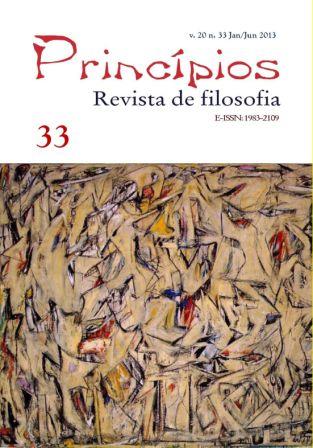ON A SUPPOSED INCOHERENCE BETWEEN KANT’S VIEW ON HOMOSEXUALITY AND HIS VIEW ON AUTONOMY
Keywords:
Teleological principle, Homosexuality, Autonomy, Formule of the universal law of natureAbstract
There are some very respectable Kant commentators who argue that Kant was not justified in using his own theory to reach the conclusions that he reached in relation to the immorality of homosexuality and some sex-related matters such as marriage and prostitution. Guyer argues that the principle that every natural organ and capacity has one and only one proper use (the teleological principle of living beings) has no fundamental normative role within Kant’s moral philosophy and although Kant does use this principle, in some aspects of his treatment of human sexuality and in some of his arguments against suicide, he has no justification for doing so. From Guyer’s viewpoint, the adoption of this principle seems to be incompatible with his fundamental principle of the unconditional value of human freedom. Denis believes that appeals to nature’s purpose for particular drives constitute a limited part of Kant’s arguments for duties to ourselves, concluding that there seems to be no support for the view that homosexual sex is wrong and that it cannot, like heterosexual sex, be made permissible by being put into a context of a mutually respectful relationship. But are these the correct interpretations of Kant’s views? Is it true that a) the teleological principle of living beings has no normative role in Kant’s philosophy, b) that appeals to nature and the ends of nature have only a limited role in Kant’s moral philosophy and c) that the right application of the Categorical imperative would never lead to the conclusions that Kant draws, that homosexuality is immoral? Here in this article it will be discussed Kant’s view on homosexuality and how Kant justifies it. The analysis carried out will show (contrarily to Guyer and Denis) that the role of the teleological principle and the Formule of the Universal Law of Nature (FLUN) - act as if the maxim of your action were to become by your will a universal law of nature - in Kant´s discussion of homosexuality is fundamental to the conclusions that he arrives on the immorality of homosexuality, suggesting that both , the teleological principle and the FLUN, have a role that is far from secondary in Kant’s moral system. The next step is to analyze how (and if) Kant’s views on homosexuality and Kant’s strong reliance on the teleological principle to ground this condemnation are consistent with his views on freedom and autonomy. The surprising conclusion is that, contrarily to contemporary interpretations of Kant’s moral philosophy, Kant’s views on homosexuality are not inconsistent with his idea of autonomy, but rather, a full comprehension of his concept of autonomy (positive freedom), requires teleological presuppositions, especially those related to the purpose of the sexual instinct in preserving the species and the purpose of the instinct of self-love in the conservation of our lives.Downloads
References
COOKE, Vincent M. “Kant, Teleology and Sexual Ethics” International Philosophical Quaterly vol. XXXI n.1 121 (March 1991)
DENIS, Lara “Kant on the wrongness of “unnatural” sex” History of Philosophy Quarterly vol.16, n.2, (April 1999)
DENIS, Lara Moral Self-Regard: Duties to Oneself in Kant’s Moral Theory (New York and London: Garland Publishing, 2001)
GUYER, Paul “Ends of Reason and Ends of Nature: The Place of Teleology in Kant’s Ethics” The Journal of Value Inquiry vol.36 (2002)
KANT, ImmanuelL Lectures on Ethics, transl. L.Infield (USA: Hackett Publishing Company, 1963); Immanuel Kant, Moralphilosophie Collins (V-Mo/Collins AA 27, 391)
KANT, Immanuel Lectures on Ethics , transl. Peter Heath (Cambridge: Cambridge University Press, 1997) (AA 27)
KANT, Immanuel The Metaphysics of Morals (The Doctrine of Virtue) (Philadelphia: University of Pennsylvania Press, 1971); Immanuel Kant Metaphysische Anfangsgründe der Tugendlehre (TL AA 06)
KANT, Immanuel The Metaphysics of Morals (The Doctrine of Right) (Cambridge: Cambridge University Press, 1991) ; Immanuel Kant Metaphysische Anfangsgründe der Rechtslehre (RL AA 06)
KANT, Immanuel Groundwork of the Metaphysics of Morals (Cambridge: Cambridge University Press, 1998) Grundlegung zur Metaphysik der Sitten (GMS AA 04)
KANT, Immanuel, Critique of Pure Reason (Indianapolis and Cambridge: Hackett Publishing Company, 1996); Immanuel Kant Kritik der reinen Vernunft (KrV B561)
KANT, Immanuel Critique of Practical Reason transl. Lewis White Beck (Indianapolis: The Bobbs Merril Company, 1956 ) ; Immanuel Kant Kritik der praktischen Vernunft (KpV AA 05)
KANT, Immanuel Critique of Judgement (Indianapolis and Cambridge: Hackett Publishing Company, 1987 ); Immanuel Kant Kritik der Urteilskraft ( KU AA 05)
PATTON, H.J The Categorical Imperative: A study in Kant’s Moral Philosophy (London: Hutchinson’s University Library, 1947)
RICHARDS, David Sex,Drugs,Death and The Law (New Jersey :Rowman and Littlefield, 1982)
RUSE, Michael Homosexuality : A philosophical Inquiry (Oxford: Basil Blackwell, 1988 )
SORELL, Tom, ‘Punishment in a Kantian Framework’ in Mat Matravers (ed) Punishment and Political Theory (Oregon: Hart Publishing, 1999)
Downloads
Published
How to Cite
Issue
Section
License
Authors retain copyright and grant the journal right of first publication with the work simultaneously licensed under a Creative Commons Attribution License that allows others to share the work with an acknowledgement of the work's authorship and initial publication in this journal.


 Português (Brasil)
Português (Brasil) English
English Español (España)
Español (España) Français (Canada)
Français (Canada)


